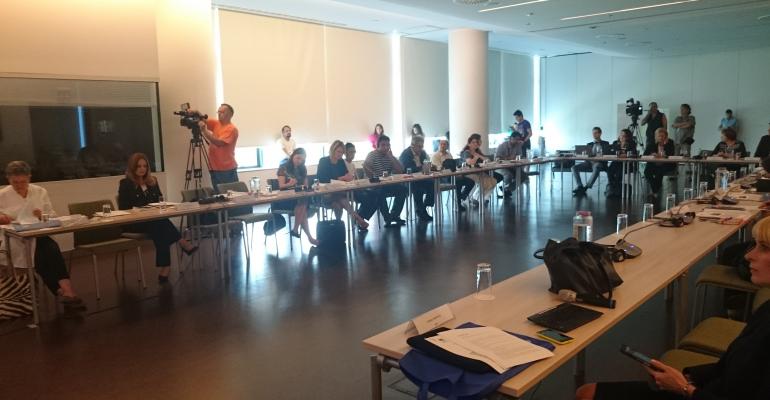
DSC_0026.JPG
Expert Round Table “Nobody should be stateless” held on 30 June 2015 in Zagreb
Published: 2015/01/07 13:04
On 30 June 2015 Information Legal Centre (ILC) and representatives of the Office of the United Nations High Commissioner for Refugees (UNHCR), Representation in the Republic of Croatia (RoC), organized the roundtable “Nobody should be stateless” at the Congress Centre Forum in Zagreb. The roundtable was a follow-up of the Conference on obtaining personal documents and registration in the South-Eastern Europe (Zagreb, 26 - 27 October 2011) and recommendations contained in the Zagreb Declaration.
The aim was to draw the attention of the public institutions and representatives of Croatian authorities, as well as the general public about the problems faced by stateless persons. International experts from Hungary and Italy, representatives of the Central Government Administration, Office of the Ombudsman, local institutions, Roma National Minority Council of the City Zagreb, international organizations, civil society organizations (CSOs), and the lawyers attended the roundtable that was covered closely by the media. The moderator of the Expert Round Table was Mrs. Daniela Drastata, known as the editor of the TV show "Prizma”.
The intention of the ILC and the UNHCR was to provide insight into the EU Member States Best Practices to Solve Statelessness and include participants in discussion with an international legal experts Dr Tamás Molnar, Chief international law advisor, Deputy State Secretariat for Hungarian Minorities and Diaspora, PM’s Office, Hungary and Mrs. Maja Bova, Expert on non-discrimination-related policies and Roma inclusion, Department for Rights and Equal Opportunities, National Office against Racial Discrimination (UNAR), Italy.
Mr. Terence Pike, UNHCR representative and Ms. Natasa Kovacevic, ILC Executive Director welcomed participants at the beginning of the round table. They highlighted that it is estimated that about 500 apatrides or people without a state or nationality live in Croatia as well as about 1,000 persons with undetermined citizenship who are in the risk of becoming stateless. There is no precise data on the number of Roma without regulated status, and it is assumed that the number of 1,500 people is certainly undervalued.
ILC Project Manager Mrs. Sanja Beslic-Kozmus and lawyer Ivana Canjuga Bedic accentuated issues tied up with the complicated procedure and pertinent legislation in the RoC. They pointed out that the current system does not provide a comprehensive solution to the persons who have not been able to regulate their status in Croatia for many, many years.
Mr. Aleksa Djokic, Deputy Head of Office for Human Rights and Rights of National Minorities informed all the present about the National Strategy for Roma Inclusion 2013 – 2020 and recommendations for the new Action Plan.
Ms. Visnja Stanic Sajatovic, Senior Adviser, Ministry of the Interior and Ms. Mirna Cikor, Senior Adviser, Ministry of Public Administration provided some information on effective measures to solve statelessness in Croatia.
After that Roma from the city of Zagreb, Muhamed Rama and Nusret Morava, introduced all with their personal experience.
Mr. Molnár informed participants why and how has Hungary set up a Statelessness Determination Procedure (SDP), explained its legal basis and main elements. The applicants are persons originating from the former Yugoslavia or Soviet Union and Palestinians, as well as some Africans.
He has emphasized New Migration Strategy adopted in October 2013 which primary objectives aim to provide the stateless with a self-standing legal status with high protection standard, effectively reducing and preventing statelessness.
Mrs. Maja Bova presented the National Roma Strategy, 2012- 2020. Mrs. Bova emphasized that Italy is among those twelve countries that have introduced the proceeding for granting statelessness, in accordance with the 1954 UN Convention - as ratified by Act No. 306/1962. She informed participants about the National Working group on Roma Legal Status coordinated by the UNHCR and its future steps.
The roundtable was completed with the conclusion that erratic practice in resolving statelessness has to be changed. Also, it was suggested to plan a meeting of all engaged in that process with the Hungarian representatives so as to apply their best practices to prevent and reduce statelessness.
The recommendations from the Expert round table will be uploaded to our web page within several days.
More info on round table and issue of statelessness you can find in PRIZMA from the 04th of July 2015 http://www.hrt.hr/enz/prizma/291020/ and 11th of July 2015 http://www.hrt.hr/enz/prizma/291840/ and following media : http://balkans.aljazeera.net/vijesti/ljudi-bez-drzavljanstva-nevidljivi-za-drustvo .
